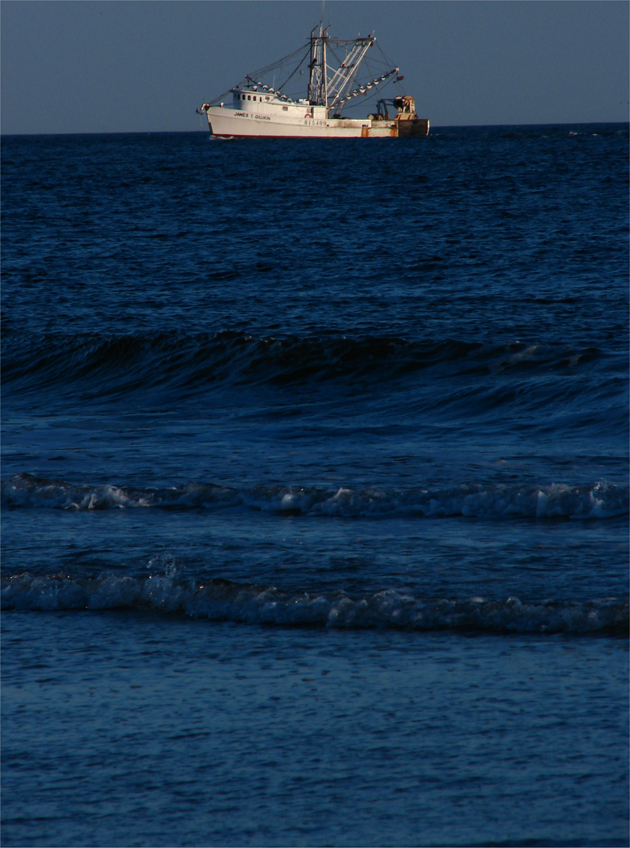Publisher's note: The article below is the accumulated effort of the Carolina Journal staff.
New report probes national, international results with market-oriented approach
RALEIGH People concerned about declining North Carolina fish stocks should take a closer look at so-called "catch shares," a system that uses property rights to help protect a valuable resource. That's the conclusion the
John Locke Foundation's top regulatory expert reaches in a new
Spotlight report.
"Injecting property rights via catch shares could bring North Carolina's fishermen the security of a guaranteed portion of the allowable fish catch, the freedom of more days at sea, the benefit of an increased harvest stock size, and the discretion to harvest in opportune times,"
said report author
Jon Sanders, JLF Director of Regulatory Studies. "Depending on the system's design, fishermen would have opportunities to trade shares and to work together voluntarily to ensure the sustainability of their calling."
Sanders examined catch shares in response to growing concerns about North Carolina's offshore fishing stocks. "What you have is a classic case of the economic problem labeled the 'tragedy of the commons,'" he said. "When a scarce resource belongs to everyone, it will tend toward depletion. The economic incentives are essentially first come, first served. That prompts a rush to consume, with no countervailing incentive to conserve."
 Just another workday here east of Oregon Inlet off North Carolina's Outer Banks. photo by Stan Deatherage
Just another workday here east of Oregon Inlet off North Carolina's Outer Banks. photo by Stan Deatherage
A 2011 report from the N.C. Division of Marine Fisheries listed 12 groups of fish as viable or recovering, while stocks of another 13 fish groups raised concerns, seven groups were depleted, and the status was unknown for another seven stocks.
"Several stocks are either highly limited or prohibited to fishermen or, in the case of black sea bass, essentially prohibited to all but a handful," Sanders said. "The situation highlights the need for new management ideas."
Congress authorized catch shares in 2007, in the form of Limited Access Privilege and Individual Fishing Quotas programs.
"This is a transformative approach to fisheries management," Sanders said. "There is a sea change in incentives away from a race-to-fish model. Instead fishing shareholders are assured a secure portion of the allowable catch and have ownership in the long-term success of the fishery."
Giving fishermen property rights leads to many benefits, Sanders said. "Catch shares encourage a more discriminating harvest, in which younger and smaller fish are left to mature and reproduce," he said. "The process allows for longer fishing seasons, reduces unnecessary investment in fishing vessels, and allows fishers discretion to harvest in safe weather conditions, when market prices are higher, or when there's a pressing need to generate income."
Some quota programs treat the privileges as tradable commodities, Sanders said. "A fisherman who exceeds his allowable catch can purchase shares from someone else, while another fishermen can sell shares to others and remain solvent when he is unable to fish," he said. "The market process allocates the resources more effectively and provides a powerful incentive to fishermen to make sure the fishery is sustainable."
Traditional fisheries management approaches have missed the mark, Sanders said. "Recognizing the dangers posed by overfishing, managers have turned to input and output controls," he explained. "Input controls include limits on permits, allowable gear and fishing methods, and available fishing areas and seasons. Output controls limit the number of fish that can be taken, along with trip and bag limits for individual fishermen."
These techniques do not promote conservation, Sanders said. "Instead fishermen have incentives to develop better gear or to devise new methods that allow them to catch more fish, and to do so faster than other fishermen, before any overall limit is reached."
The command-and-control management system also can lead to safety problems and an increasingly adversarial relationship between fishermen and managers, Sanders said.
Sanders highlights research about the effectiveness of catch shares for the United States and around the globe. He notes the importance of designing programs carefully. "These programs must address local stakeholders' concerns," Sanders said. "Reliable, real-time catch data and proper monitoring and enforcement are crucial elements. These programs need to be scientifically based. And it's important to note that not all fisheries are appropriate for catch shares."
The U.S. government has been spending $70 million a year to bail out failing federally managed fisheries under traditional management systems, Sanders said. "Catch shares' potential to halt and maybe even reverse this collapse of fisheries would have resounding economic effects," he said. "Recent research suggests catch shares also would have a net positive effect on the federal deficit, through greater income tax revenue and other factors."
























